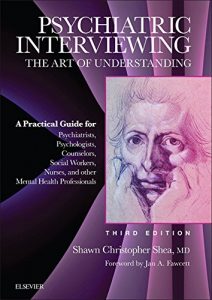With time at a premium, today's clinicians must rapidly engage their patients while gathering an imposingly large amount of critical information. These clinicians appropriately worry that the "person" beneath the diagnoses will be lost in the shuffle of time constraints, data gathering, and the creation of the electronic health record. Psychiatric Interviewing: The Art of Understanding: A Practical Guide for Psychiatrists, Psychologists, Counselors, Social Workers, Nurses, and other Mental Health Professionals, 3rd Edition tackles these problems head-on, providing flexible and practical solutions for gathering critical information while always attending to the concerns and unique needs of the patient.
Over five years in the making, this classic introduction to the art of clinical interviewing returns, updated, expanded and innovatively designed for today's reader with over 7.5 hours of streaming video integrated directly into the text itself. Readers now also become viewers, acquiring the rare opportunity to see the author both illustrating specific interviewing techniques and subsequently discussing effective ways in which to employ them. The founder and Director of the acclaimed Cape Cod Symposium, Rob Guerette, describes Dr. Shea's skills as a speaker as follows, "Dr. Shea is an extremely gifted teacher, whose vibrant story-telling skills and compelling videos have led to him garnering some of the highest evaluations in the 30 year history of the Cape Cod Symposium. In short, readers are in for a rare treat when viewing the book's video component."
Within the text, Dr. Shea deftly integrates interviewing techniques from a variety of professional disciplines from psychiatry to clinical psychology, social work, and counseling providing a broad scope of theoretical foundation. Written in the same refreshing, informal writing style that made the first two editions best sellers, the text provides a compelling introduction to all of the core interviewing skills from conveying empathy, effectively utilizing open-ended questions, and forging a powerful therapeutic alliance to sensitively structuring the interview while understanding nonverbal communication at a sophisticated level. Updated to the DSM-5, the text also illustrates how to arrive at a differential diagnosis in a humanistic, caring fashion with the patient treated as a person, not just another case.
Whether the reader is a psychiatric resident or a graduate student in clinical psychology, social work, counseling or psychiatric nursing, the updated third edition is designed to prepare the trainee to function effectively in the hectic worlds of community mental health centers, inpatient units, emergency rooms, and university counseling centers. To do so, the pages are filled with sample questions and examples of interviewing dialogue that bring to life methods for sensitively exploring difficult topics such as domestic violence, drug abuse, incest, antisocial behavior, and taking a sexual history as well as performing complex processes such as the mental status. The expanded chapter on suicide assessment includes an introduction to the internationally acclaimed interviewing strategy for uncovering suicidal ideation, the Chronological Assessment of Suicide Events (CASE Approach). Dr. Shea, the creator of the CASE Approach, then illustrates its techniques in a compelling video demonstrating its effective use in an interview involving a complex presentation of suicidal planning and intent
.A key aspect of this text is its unique appeal to both novice and experienced clinicians. It is designed to grow with the reader as they progress through their graduate training, while providing a reference that the reader will pull off the shelf many times in their subsequent career as a mental health professional












